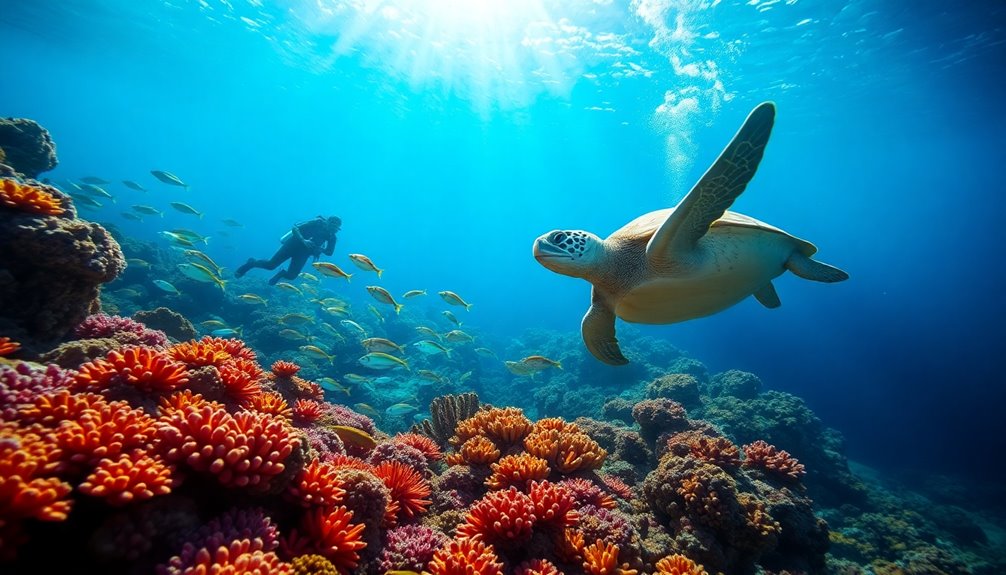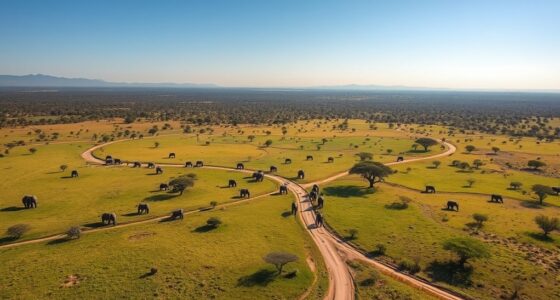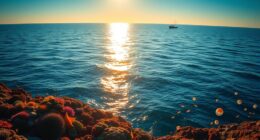Marine conservation is vital for protecting our oceans and ensuring healthy ecosystems that provide food, oxygen, and climate stability. By preserving marine life, you support biodiversity and enhance community resilience. Pollution, overfishing, and climate change pose serious threats to marine environments, but your individual choices can make a difference. Engaging in sustainable practices not only helps marine habitats thrive but also fosters responsibility for future generations. Discover how your actions can lead to a more sustainable ocean.
Key Takeaways
- Marine conservation is vital for sustaining resources like food and oxygen, ensuring a healthy environment for future generations.
- Protecting marine ecosystems helps mitigate climate change by sequestering carbon dioxide and maintaining temperature stability.
- Pollution, climate change, and overdevelopment threaten marine habitats, necessitating immediate conservation efforts.
- Sustainable practices, such as responsible fishing and eco-friendly transportation, contribute to healthier oceans and biodiversity.
- Individual actions, like reducing plastic use and supporting certified fisheries, collectively enhance marine conservation efforts.
The Importance of Marine Conservation

Marine conservation is crucial not just for the health of our oceans, but for our survival as well. You mightn't realize it, but the oceans provide essential resources like food, oxygen, and medicine. By protecting marine ecosystems, you're ensuring these resources remain abundant for future generations.
Healthy oceans support biodiversity, which directly impacts your well-being and the planet's stability. When marine life thrives, it helps maintain the balance of ecosystems, filtering pollutants and supporting climate resilience.
Moreover, engaging in conservation efforts can foster a sense of community and responsibility. By getting involved, whether through advocacy or local initiatives, you contribute to a sustainable future.
The Role of Oceans in Climate Regulation

Oceans play a vital role in regulating the Earth's climate, acting as a massive heat reservoir that absorbs and distributes solar energy. They help moderate temperatures, preventing extreme weather patterns and maintaining a stable climate.
Water has a high heat capacity, meaning it can store energy for long periods. This process not only affects local climates but also global weather systems. When you think about how ocean currents transport warm and cold water, you realize their influence on atmospheric conditions.
Additionally, oceans sequester carbon dioxide, reducing greenhouse gas concentrations in the atmosphere. By understanding this crucial role, you can appreciate the importance of protecting our oceans to ensure they continue to function effectively in climate regulation.
Biodiversity and Ecosystem Services

The health of our planet hinges on the rich biodiversity found within marine ecosystems, which provide a wide range of services vital to both nature and humanity.
You mightn't realize it, but these ecosystems contribute to food security, coastal protection, and climate regulation. Healthy coral reefs, for example, support countless species and help buffer shorelines against storms.
By sustaining diverse marine life, you ensure nutrient cycling and water purification, both essential for thriving ecosystems. Additionally, these rich habitats offer recreational opportunities and economic benefits through tourism and fisheries.
Threats to Marine Environments

As human activities continue to intensify, various threats to marine environments have emerged, putting immense pressure on these delicate ecosystems.
Pollution, particularly from plastics and chemicals, contaminates waters and harms marine life. Climate change is causing ocean temperatures to rise, leading to coral bleaching and habitat loss. Overdevelopment along coastlines disrupts natural habitats and threatens biodiversity.
Additionally, invasive species introduced by human actions can outcompete native organisms, further destabilizing ecosystems. Unsustainable tourism practices contribute to habitat degradation, while shipping and maritime activities increase the risk of oil spills.
The Impact of Overfishing

While many people enjoy seafood as a staple in their diets, overfishing poses a significant threat to marine ecosystems.
When you consume fish, you mightn't realize the impact your choices have on fish populations. Overfishing depletes key species, disrupting food chains and leading to imbalances in ocean habitats. This decline not only threatens fish but also the entire marine life that relies on them for survival.
Your seafood choices impact fish populations, disrupting ecosystems and threatening the delicate balance of marine life.
Moreover, overfishing affects local communities that depend on fishing for their livelihoods, leading to economic challenges.
By supporting sustainable fishing practices and being mindful of your seafood choices, you can contribute to preserving marine biodiversity.
Pollution and Its Consequences

Overfishing isn't the only threat facing our oceans; pollution plays a significant role in degrading marine environments.
Every time you toss plastic into the ocean or use chemical fertilizers, you're contributing to a larger problem. Marine life suffers as toxic substances seep into their habitats, leading to devastating consequences like coral bleaching and fish mortality.
You mightn't see it directly, but pollutants disrupt the delicate balance of marine ecosystems. Fish and other wildlife ingest these harmful materials, which can ultimately affect your health when you consume seafood.
Reducing your waste and opting for eco-friendly products can make a difference. Every small action counts in the fight against pollution, helping to ensure healthier oceans for future generations.
Climate Change and Ocean Health

Climate change significantly impacts ocean health, affecting everything from sea temperatures to acidification levels. You might notice warmer waters leading to coral bleaching, which threatens marine biodiversity.
As temperatures rise, many species struggle to adapt, altering their migration patterns and breeding seasons. Increased carbon dioxide levels cause ocean acidification, making it harder for shellfish and other marine organisms to form their shells. This disrupts entire ecosystems, impacting food chains and your seafood supply.
Moreover, extreme weather events, fueled by climate change, can devastate coastal habitats. By understanding these effects, you can advocate for policies that combat climate change, support marine conservation efforts, and reduce your carbon footprint, ultimately helping to restore and protect the health of our oceans.
Sustainable Fishing Practices
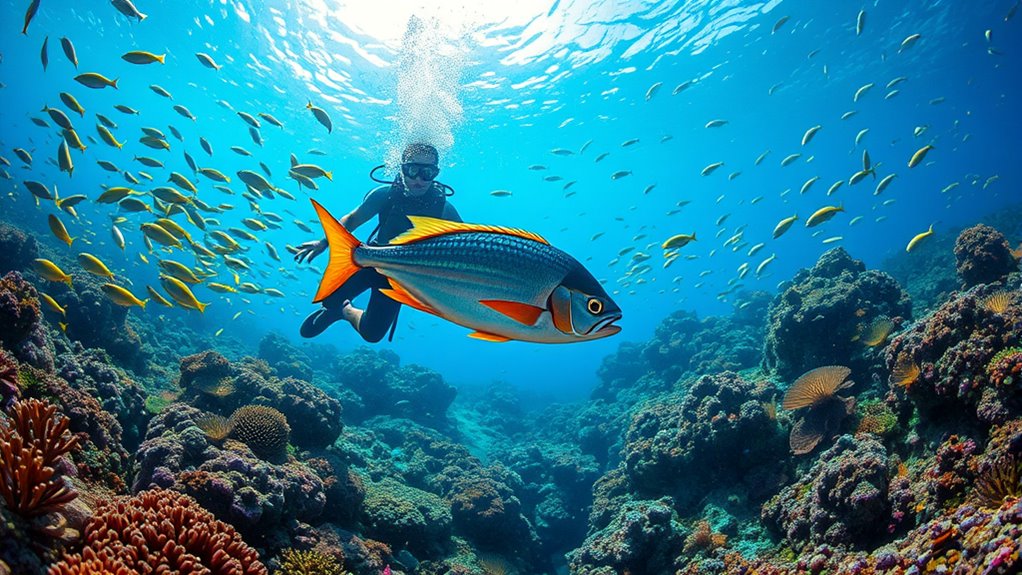
Sustainable fishing practices are vital for preserving our oceans and ensuring that fish populations thrive for future generations. By choosing to support fisheries that prioritize sustainability, you help reduce overfishing and protect marine ecosystems.
Opt for seafood labeled with certifications like MSC or ASC, which indicate responsible practices. You can also consider eating lower-trophic species that reproduce faster, helping to balance the ecosystem.
Engaging in catch-and-release fishing can further safeguard populations, allowing fish to reproduce before they're harvested. Stay informed about local regulations and seasonal restrictions to avoid fishing during spawning periods.
Community Engagement in Conservation Efforts

While many people might think marine conservation is solely the responsibility of scientists and policymakers, engaging local communities is crucial for effective conservation efforts.
You can play a vital role by participating in local initiatives, attending community meetings, and spreading awareness about marine issues. When communities work together, they identify unique challenges and solutions tailored to their specific environments.
Supporting local conservation groups not only strengthens your community but also fosters a sense of ownership over marine resources. You'll find that when people feel connected to their oceans, they're more likely to protect them.
How Individuals Can Make a Difference
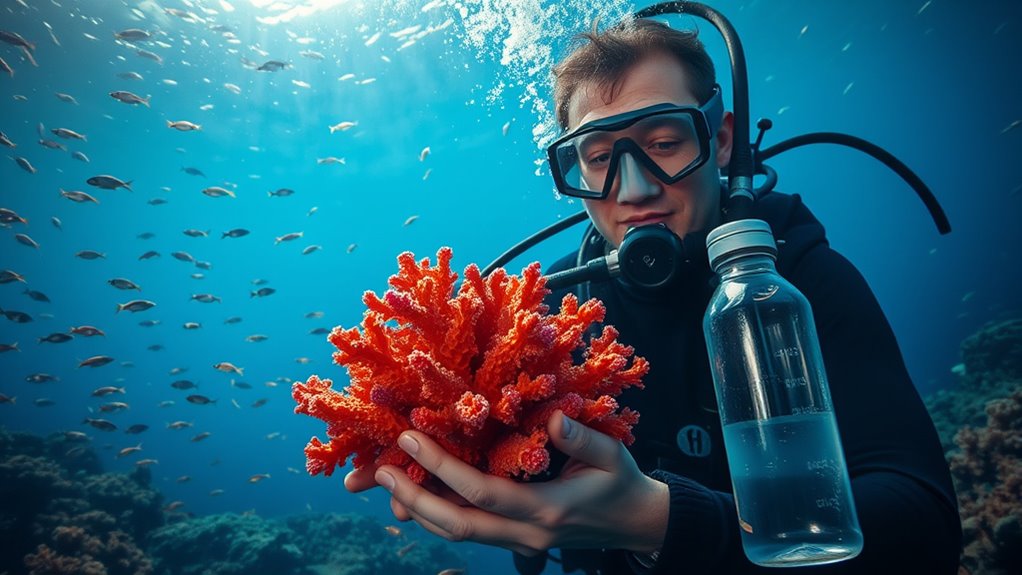
Local communities play a vital role in marine conservation, but individuals also have the power to make a significant impact.
You can start by reducing plastic use; opt for reusable bags, bottles, and straws. Participate in local beach clean-ups or organize one with friends. Educate yourself and others about marine ecosystems and the threats they face.
Support sustainable seafood by checking labels and choosing responsibly sourced options. Advocate for policy changes by contacting your representatives and urging them to prioritize marine protection.
Finally, consider reducing your carbon footprint by using public transport or biking. Every small action counts, and by making conscious choices, you contribute to a healthier ocean and a brighter future for marine life.
Your involvement matters!
Frequently Asked Questions
What Are the Most Endangered Marine Species Currently?
You'll find that many marine species face critical endangerment today. Among the most vulnerable are the vaquita, a small porpoise, and the northern white rhino of the sea, the Atlantic bluefin tuna.
Sea turtles, particularly the hawksbill and leatherback, also struggle for survival due to habitat loss and poaching. Additionally, many shark species, like the hammerhead, face threats from overfishing.
It's crucial to stay informed and support conservation efforts for these endangered marine animals.
How Do Marine Protected Areas Work?
Imagine a sanctuary where nature thrives—marine protected areas (MPAs) create just that.
They work by restricting human activities like fishing or drilling in designated zones, allowing ecosystems to recover and flourish.
You'll find that these areas enhance biodiversity, protect endangered species, and restore habitats.
By establishing MPAs, you're not just preserving marine life; you're also ensuring future generations can enjoy the beauty and bounty of our oceans.
It's a win-win for everyone!
What Role Do Coral Reefs Play in Marine Ecosystems?
Coral reefs play a crucial role in marine ecosystems. They provide habitat and shelter for countless marine species, supporting biodiversity.
You'll find that reefs act as natural barriers, protecting coastlines from erosion and storm damage. They also contribute to nutrient cycling, helping maintain the health of the ocean.
Plus, coral reefs support local economies through tourism and fishing. Their health directly impacts the entire marine ecosystem, so it's vital to protect them.
How Can Tourism Impact Marine Conservation Efforts?
Did you know that tourism can generate over $1 trillion annually for coastal economies?
However, it can also negatively impact marine conservation efforts. When you visit popular destinations, your activities, like snorkeling or diving, can disturb delicate ecosystems. Overcrowding leads to pollution and habitat destruction.
But, by choosing eco-friendly tours and respecting marine life, you can help minimize these impacts. Your choices matter, and they can support healthier oceans for future generations.
What Are the Signs of a Healthy Ocean?
A healthy ocean shows vibrant colors, with clear waters and thriving coral reefs.
You'll notice an abundance of fish and diverse marine life, indicating balanced ecosystems. When you see sea turtles nesting or dolphins playing, it's a good sign.
Additionally, healthy seagrass beds and mangroves provide vital habitats.
You'll find clean beaches free from pollution, and when you encounter local wildlife thriving, it's clear the ocean is in good shape.
Conclusion
In the grand scheme of things, it's amusing how a single plastic straw can spark a debate about ocean conservation. Yet, here you are, armed with knowledge and power to make a difference. By choosing sustainable seafood or joining local cleanup efforts, you're not just a spectator; you're a hero in disguise! So, while some might think their actions are too small to matter, remember: even the tiniest wave can create a ripple of change in our oceans.
